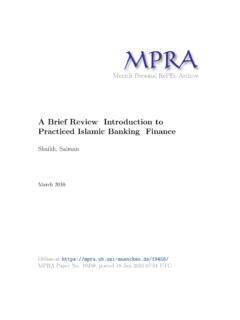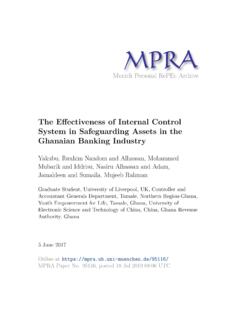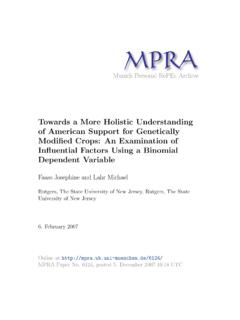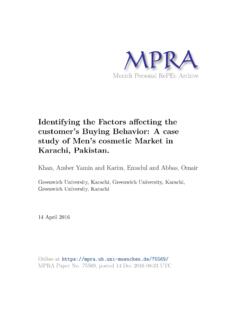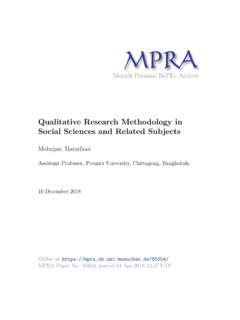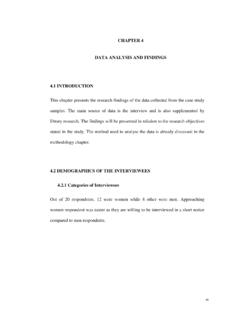Transcription of Islamic Economic Principles Prohibition of Riba Gharar and ...
1 Munich Personal RePEc ArchivePrinciples of Islamic Finance: Prohibition of Riba, Gharar and MaysirUddin, Md AktherINCEIF, Kuala Lumpur, Malaysia13 October 2015 Online Paper No. 67711, posted 09 Nov 2015 09:32 UTCP rinciples of Islamic Finance: Prohibition of Riba, Gharar and Maysir Md Akther Uddin1 Abstract Islamic finance, a complete rule based financial system, fundamentals of which are originated from revealed verses of the Holy Quran considered direct ordinance from the God and the practices of Prophet Muhammad (PBUH) commonly known as ahadith. Although the concept of Islamic finance is as old as the religion itself but in the Middle Ages Muslims diverted from the original teachings of Islam, only recently Islamic finance has started to reemerge.
2 Therefore, it is necessary to understand the fundamental rules that make Islamic finance different from its counterpart. In this paper an attempt has been made to discuss briefly fundamental Principles of Islamic finance namely Prohibition of Riba (interest), Gharar (uncertainty) and Maysir (gambling). It is found in the study that these Principles are based on the fundamental sources and early Islamic jurists, scholars and contemporary researchers uphold them in carrying out financial transactions. In order to run financial system according to the Islamic Principles these concepts must be understood clearly and all transactions must be free from them.
3 Key words: Islamic finance, Riba, Gharar , Maysir 1 Corresponding author, Graduate student in Islamic finance at INCEIF, Lorong Universiti A, 59100 Kuala Lumpur, Malaysia. Phone: +6 01112549795 Email: Introduction: Prohibition of Riba, Gharar and Maysir in financial transactions is the fundamental of Islamic finance which distinguishes it from conventional finance. These unique features of Islamic finance are going to be discussed from the Shari ah, Quran and Sunnah, perspective; a brief literature review has been conducted to clearify these concepts, current practices and controversial issues in not only conventional but also Islamic finance industry.
4 Riba: Riba is derived from the derivative word raba-wa it has certain meanings as to increase; to grow; to grow up, to exceed, be more than. In the specific sense, Riba is generally translated into English as usury or interest but in fact it has a much broader sense under Shari ah (Haqqi, 2009; ). Usurious transactions were classified into two categories: a) Riba al-fadl, the excess over and above the loan paid in kind. It lies in the payment of an addition by the debtor to the creditor in exchange of commodities of the same kind and b) Riba al-nasi ah, refers to the interest on loans; its Prohibition essentially implies that the fixing in advance of a positive return on a loan as a reward for waiting is not permitted in Islam.
5 Haqqi(2009) states that some scholars added a third category of Riba named Riba al- jahiliyah or pre- Islamic Riba, often manifested by the lender asking the borrower at maturity date if he will settle the debt or increase it. On Riba, the direct Quranic references are to be found in four surahs or chapters. These verse are an ascending scale which starts with a mere judgment of value, followed by an implicit Prohibition , then a limited one and finally, a total and conclusive Prohibition (Al-Rum, 30:39; Al-Nisa, 4:161; Ali-Imran, 3:130 and Al-Bakarah, 2:275-9). Moreover, the detailed varieties of usurious transactions as well as such Prohibition have explained and elaborated by the Sunnah.
6 For example, the Messenger of Allah ( ) has cursed the one who accepted Riba, the one who paid it, the one who recorded it, and the two witness of it, saying they were all It is also reported that the Prophet ( ) has said to the effect: (Exchange) gold for gold, silver for silver, wheat for wheat, barley for barley, dates for dates, salt for salt, measure for measure and hand to hand. If the (exchanged) articles belong to different genera, the exchange is without restraint provided it takes place in a hand to hand transaction. 3 It is more than evident from the above discussion that Riba , interest in the modern world is categorically prohibited in the Holy Quran and practices of the Prophet ( ).
7 Riba arises with loan: car loan, home loan, term loan or overdraft, hire purchase loan and personal loan; Riba in savings and fixed deposit account; Riba in credit card. More often than not Riba is intertwined with modern banking and finance. 2 Muslim, Sahih, vol. III, , hadith no. 1597; al-Bukhari, Muhammad ibn Ismail, (1407/1987), 1st ed., vol. III al-Shaikh Qasim al-Rifai(edt), Beirut: Dar al-Qalam, pp. 128-9, hadith 3 Muslim, Shahih, vol. III, Gharar : The Arabic word Gharar is a fairly broad concept that literally means deceit, risk, fraud, uncertainty or hazard that might lead to destruction or loss.
8 Hanafi scholars have defined Gharar as something which its consequence is undetermined. While Shafi i scholars have described it as something which in its manner and its consequence is hidden. According to Al-Sarakshi, anything that the end result is hidden or the risk is equally uncommon, whether it exists or not. Therefore, Gharar in Islam refers to any transaction of probable objects whose existence or description are not certain, due to lack of information and knowledge of the ultimate outcome of the contract or the nature and quality of the subject matter of it. Gharar is divided into two types: Gharar fahish (excess Gharar ) and Gharar yasir (light Gharar ).
9 Examples of Gharar fahish in contracts are plenty as shown by the Al-Hadith and normally is associated with the reasons why Gharar sales are prohibited. On the other hand, Gharar yasir, which means small in amount or trivial is the uncertainty that is always present in all contracts and conducts, thus its existence is tolerated. All scholars agree that every transaction have some amount of Gharar in it but they start to differ when referring to the amount of Gharar contained in each. There is no specific evidence from the Quran which connotes Gharar , however, Allah ( ) mention Eat not your property among yourselves unjustly by falsehood and deception, except it be a trade amongst you by mutual consent (Al-Bakarah, 2:188; Al-Nisa, 4:29).
10 The Quran has categorically prohibited gambling (Al-Bakarah, 2:219 and Al-Maidah, 5:93). Many scohalrs argue that Gharar is one of the branches of gambling (Rahman, 2010; ). In addition to that tradition of our beloved Prophet ( ) on many occasions forbade many transactions which included Gharar . For example, the Prophet ( ) has forbidden the purchase of the unborn animal in the mother s womb, the sale of the milk in the udder without measurement, the purchase of spoils of war prior to distribution, the purchase of charities prior to their receipt, and the purchase of the catch of a diver. Gharar occurs in all sorts of transactions where the subject matter, the price or the two, are not determined and fixed in advance.
